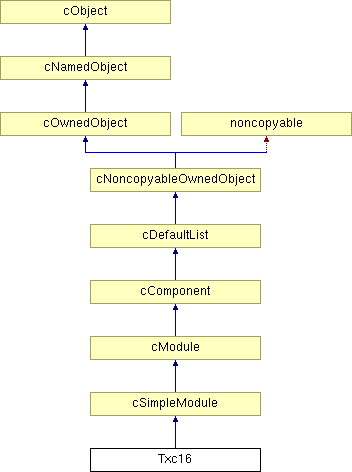Txc16 Class Reference

Protected Member Functions | |
| virtual TicTocMsg16 * | generateMessage () |
| virtual void | forwardMessage (TicTocMsg16 *msg) |
| virtual void | initialize () |
| virtual void | handleMessage (cMessage *msg) |
Private Attributes | |
| simsignal_t | arrivalSignal |
Detailed Description
The main problem with the previous step is that we must modify the model's code if we want to change what statistics are gathered. Statistic calculation is woven deeply into the model code which is hard to modify and understand.
OMNeT++ 4.1 provides a different mechanism called 'signals' that we can use to gather statistics. First we have to identify the events where the state of the model changes. We can emit signals at these points that carry the value of chosen state variables. This way the C++ code only emits signals, but how those signals are processed are determined only by the listeners that are attached to them.
The signals the model emits and the listeners that process them can be defined in the NED file using the 'signal' and 'statistic' property.
We will gather the same statistics as in the previous step, but notice that we will not need any private member variables to calculate these values. We will use only a single signal that is emitted when a message arrives and carries the hopcount in the message.
Member Function Documentation
| void Txc16::forwardMessage | ( | TicTocMsg16 * | msg | ) | [protected, virtual] |
Referenced by handleMessage().
00109 { 00110 // Increment hop count. 00111 msg->setHopCount(msg->getHopCount()+1); 00112 00113 // Same routing as before: random gate. 00114 int n = gateSize("gate"); 00115 int k = intuniform(0,n-1); 00116 00117 EV << "Forwarding message " << msg << " on gate[" << k << "]\n"; 00118 send(msg, "gate$o", k); 00119 }
| TicTocMsg16 * Txc16::generateMessage | ( | ) | [protected, virtual] |
Referenced by handleMessage(), and initialize().
00091 { 00092 // Produce source and destination addresses. 00093 int src = getIndex(); 00094 int n = size(); 00095 int dest = intuniform(0,n-2); 00096 if (dest>=src) dest++; 00097 00098 char msgname[20]; 00099 sprintf(msgname, "tic-%d-to-%d", src, dest); 00100 00101 // Create message object and set source and destination field. 00102 TicTocMsg16 *msg = new TicTocMsg16(msgname); 00103 msg->setSource(src); 00104 msg->setDestination(dest); 00105 return msg; 00106 }
| void Txc16::handleMessage | ( | cMessage * | msg | ) | [protected, virtual] |
Reimplemented from cSimpleModule.
00062 { 00063 TicTocMsg16 *ttmsg = check_and_cast<TicTocMsg16 *>(msg); 00064 00065 if (ttmsg->getDestination()==getIndex()) 00066 { 00067 // Message arrived 00068 int hopcount = ttmsg->getHopCount(); 00069 // send a signal 00070 emit(arrivalSignal, hopcount); 00071 00072 EV << "Message " << ttmsg << " arrived after " << hopcount << " hops.\n"; 00073 bubble("ARRIVED, starting new one!"); 00074 00075 delete ttmsg; 00076 00077 // Generate another one. 00078 EV << "Generating another message: "; 00079 TicTocMsg16 *newmsg = generateMessage(); 00080 EV << newmsg << endl; 00081 forwardMessage(newmsg); 00082 } 00083 else 00084 { 00085 // We need to forward the message. 00086 forwardMessage(ttmsg); 00087 } 00088 }
| void Txc16::initialize | ( | ) | [protected, virtual] |
Reimplemented from cComponent.
00050 { 00051 arrivalSignal = registerSignal("arrival"); 00052 // Module 0 sends the first message 00053 if (getIndex()==0) 00054 { 00055 // Boot the process scheduling the initial message as a self-message. 00056 TicTocMsg16 *msg = generateMessage(); 00057 scheduleAt(0.0, msg); 00058 } 00059 }
Member Data Documentation
simsignal_t Txc16::arrivalSignal [private] |
Referenced by handleMessage(), and initialize().
The documentation for this class was generated from the following file:
 1.6.3
1.6.3